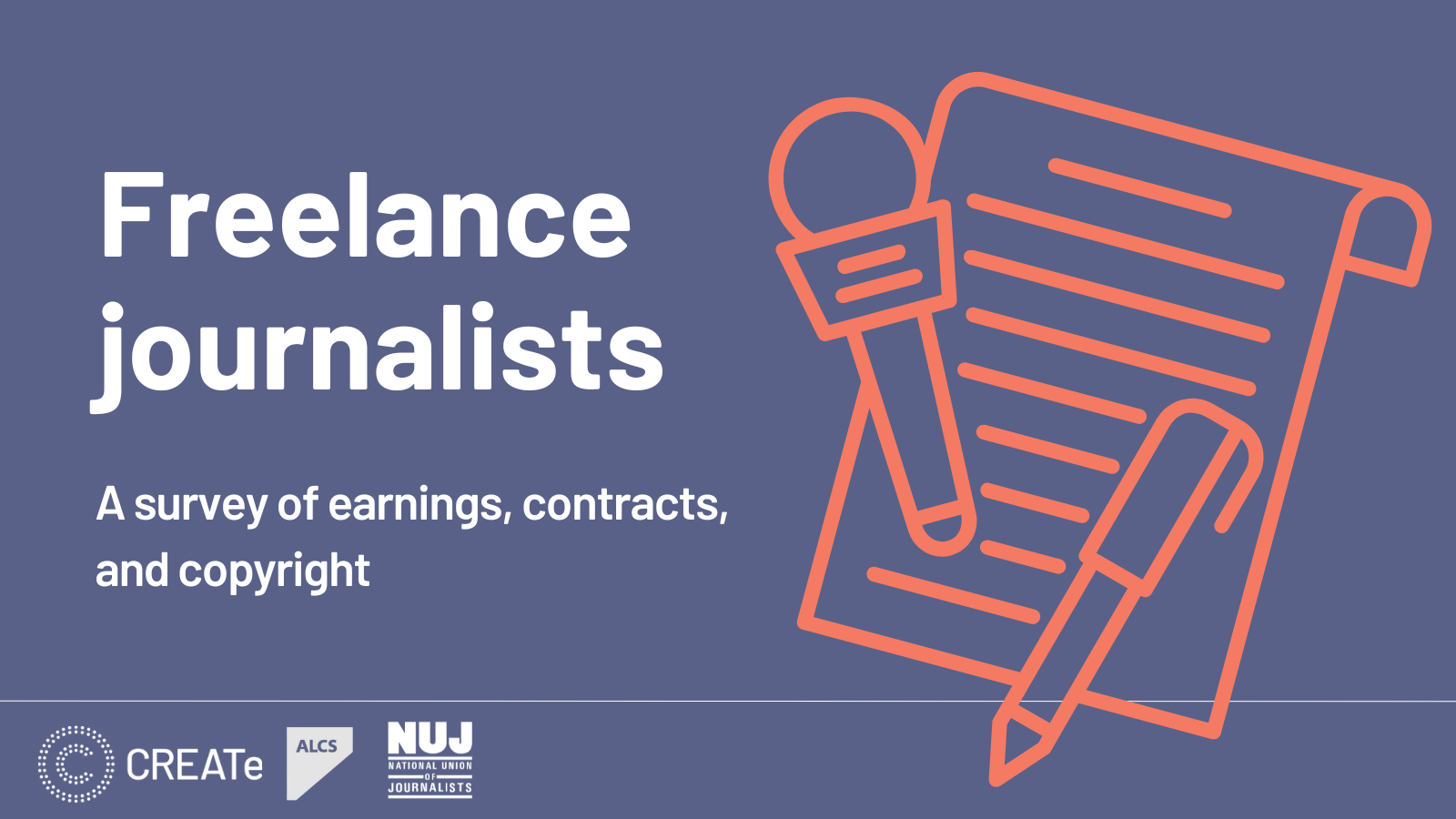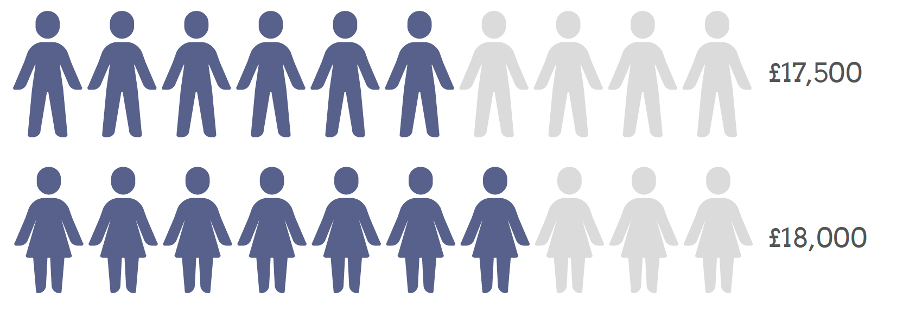
CREATe is pleased to launch our latest report: ‘Freelance journalists: A survey of earnings, contracts, and copyright’. Led by Amy Thomas, Michele Battisti and Martin Kretschmer, this report is part of a series of longitudinal research on creators’ earnings and contracts, forming a core part of our new research theme, Dealing with Creators. This report was funded as independent research by the UK Authors’ Licensing and Collecting Society (ALCS), in collaboration with the National Union of Journalists (NUJ), and was launched at the All Party Writers Group reception at the House of Commons on 19 March 2024.
Read the report:
Digital report (with responsive visualisations)
PDF report (static visualisations only)
Word report (limited visualisations)
Executive summary
This report presents the findings of a survey of about 10,000 UK-based freelance journalists, receiving a response from almost 500 respondents. The survey included information on freelance journalists’ earnings, including factors that affect earnings, such as contracts and copyright. Given the importance of independent journalism, the report asked exploratory questions about the feasibility of, and sustainability of, reasonable working conditions for freelance journalists. We find that the contingency of independent journalism is dependent on several, precarious, support structures.
The findings of this report focus mainly on primary occupation freelance journalists, being defined as those who allocate at least 50% of their working time to freelance journalism. For those journalists we find that their freelance activities earn them a typical median income of £17,500 per annum; a figure less than minimum wage in the UK, assuming a typical 35-hour work week. Due to low earnings, most journalists subsidise their income with ‘day jobs’ or from the income of other household members. In the context of proposed regulatory changes surrounding online platforms, we find that only 7% of primary occupation journalists have ever received a payment as a result of existing (international) licensing agreements between press publishers and online platforms, suggesting that these have not been conducive to increasing their income in their present configuration, at least up to the present day.
This report also investigates earning differences for demographic groups. We see an encouraging reverse gender gap, with more women than men among our respondents, and with women earning slightly higher earnings than men.

We also find that there is a higher percentage of LGBTQIA+ journalists in the freelance industry when compared with the general population, and that they too earn on average more than their heterosexual counterparts (with LGBTQIA+ journalists earning a typical median income of £18,000 compared to £17,500 of heterosexual journalists). On the other hand, other marginalised demographic groups have a smaller presence in the profession, and earn far less. Journalism is overwhelmingly a white profession, and whilst we caution that there is a very small number of minority ethnicities represented in these survey findings, those black journalists who responded to the survey earn seven times less than white journalists. Journalism also appears to be a privileged profession, with most journalists hailing from a privileged socio-economic background, and earning more than those with lower socio-economic backgrounds.
In our assessment of contracts and copyright, we find evidence of informal, ‘back of the envelope’, contractual practices between journalists and news publishers. Off-hand emails, WhatsApp’s, and oral agreements are routinely employed in this industry, which lessens the security of a freelance journalist if they are exposed to a dispute. More worryingly, 40% of freelance journalists undertook work without any contract at all. We also find evidence of a rush to ‘rights grab’, referring to more encompassing copyright transactions and longer claims on exclusivity. We find that nearly half all journalists assign their copyright (47%) to news publishers, and that half have signed an exclusivity clause (47%), some which have lasted in perpetuity.
From the authors
Amy Thomas, lead author of the report said:
“In the findings from our survey, the metaphor of freelance journalism as the Wild West is a telling one – respondents are telling us that this has become the lived reality of the modern freelance journalist. With shrinking newsrooms, mass redundancies, and the decline of regional news, freelancing is becoming the new normal. But, between tenuous working conditions and unstable sources of earnings, we find that the high value of journalism, in promoting a politically informed citizenry, does not translate to a commensurate award in the form of a liveable wage.
This trajectory of overall low earnings is also intrinsically related to our finding that 60% of journalists come from a privileged socio-economic background. There appears to be an industry expectation that journalists can supplement their income from another source as a result of their social or economic privilege. The risk of this expectation is of course that journalists from lower socio-economic backgrounds are not meaningfully enabled to begin, or sustain, a career in this industry, worsening the level of diversity in the profession overall. And further – this expectation can be used to justify harmful industry practices, such as working without a contract, or withholding pay until publication of an article.”
“Among several key findings, the fact that only one in ten journalists have received payments from licensing agreements made with online platforms, despite their increasing importance in society, signals a potential critical gap in supporting the economic foundations of journalism in the future. Continuing to learn more about these dynamics is a crucial step towards ensuring that economic constraints do not limit the role of journalism as a watchdog and a mirror to society.”
Martin Kretschmer, Director of CREATe and co-author of the report said:
“The series of surveys we have conducted since 2006 reveal a picture of creative labour markets in the UK that is uncomfortable, and changing in the wrong direction. In part, this is due to crisis factors, such as the financial crunch, Covid and Brexit. But underlying is a trend towards a digital gig economy that policy has not been able to address.
Our latest data on freelance journalists indicates a still strong reliance in earnings on traditional media organisations. Whether new digital business models can deliver sustainable quality journalism is one of the big questions of our time. It matters for the future of democratic societies.”


